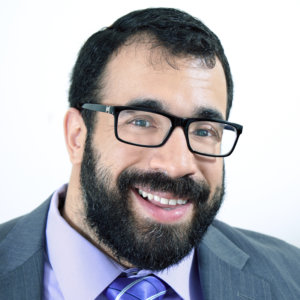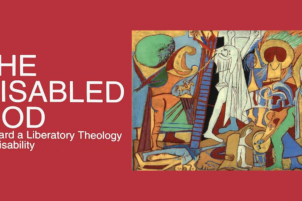It was probably 20 or more years ago that I first heard the words “please rise if you are able” while sitting in a service. While there are obvious flaws in this construction, not the least of which being the express exclusion of those, who, like me, might not be able to rise in the traditional sense of standing, the phrase was revolutionary to me. For the first time, I was sitting in a service, and I no longer had to feel awkward as the noncompliant one.
Now, I know, and knew even as a young man, that I did not have a halachic obligation to stand. And yet, the overt sense that there was no place for me in the choreography of the service created great discomfort.
People would often ask me for my suggestions on what phrase to say. I would try to decline, because I believed then and believe now that these are deliberations for a community to have, not decisions for one person to make. Nonetheless, if pressed, I would offer the iteration that I’d found least troubling, “please rise in body or spirit.” Finally, a straight up alternative for those of us who couldn’t stand.
However, this, too, had weaknesses. Was it really an appropriate dichotomy? Shouldn’t we all be rising in spirit, regardless of the position of our body? It was imperfect, to say the least. When I was pushed to give a better alternative, by someone who also recognized these weaknesses, I offered, “please rise in spirit, and if able, in body.” Talk about an awkward and clunky instruction. I’m all for making people think, but maybe not when they’re about to start the Amidah.
So, I again defaulted to my notion that communities should work it out for themselves. And communities did indeed work out interesting solutions. When co-leading a morning service at the annual convention of the Central Conference of American Rabbis a few years ago, I learned from my friend, Cantor Faryn Kates Rudnick, that the congregation she served in Illinois dispensed with a choreographic instruction in favor of an instruction to “prepare yourself” for the prayer in question. While I find that philosophically interesting, I was never able to fully internalize the notion that we should take elevation off the table. But, that doesn’t matter. The point is that that community found something that worked for them.
Just because I don’t want to tell other people what to say, doesn’t mean I’m unhappy to share the wonderful dialogue that we’ve been having at IKAR, the prayer community that I call home. I hope that people will read the following as considerations, rather than a recommendation, per se.
It all started just after I moved to LA. I went to IKAR, known as an incredibly thoughtful community, and was shocked to learn that this highly inclusive home for social justice was still using the original “please rise.” I had found exclusive language in the most inclusive community I’d ever had the pleasure to attend.
In true IKAR fashion, this situation only lasted until the Oneg. It was there that I quietly approached Rabbi Sharon Brous and shared my surprise. In what I now know was perfectly characteristic for her, she listened intently, and asked me to send her more information. The following week, she was ready with questions. “Did rise already encompass more than standing?” I pointed out that it might, but that one would have to be very clear that that broad definition was intended, if it were not to have an exclusionary effect. In the three months before the pandemic, IKAR experimented with language. Sometimes it was the old standby, “if you are able.” Sometimes, it was “body or spirit” [no one really wanted my clunky suggestion]. Sometimes, because people are human, it was still missed. But progress was being made.
I’m not really a big fan of streaming services, so, for me, the conversation was on hold for much of the last two years, though I have no doubt that experimentation continued. It was thus with delight that I arrived at Rosh Hashanah services, in person (albeit with mandatory vaccination, social distancing, and KN-95 masking) and found myself being invited to “please rise in any way you are able.” After the service, I went up to Rabbi Brous to complement her on this lovely innovation. She evidenced some surprise, and said, “oh, I thought I got it from you.” (Side note: the sign of a truly good interaction is one where you can’t even be sure who was responsible for your favorite suggestion). I demurred, and then suggested – why should we be limited to one way? Why not, “please rise in every way in which you are able?” She agreed.
I have to say, I love this story. I love the fact that it came out of a dialogue so rich that we can’t even quite figure out how we got there. I love the fact that it highlights that we are less about things we can’t do, and more about the different paths to spirituality that we all have. But mostly, I love what happened next.
The discussion that I’m describing happened at erev Rosh Hashanah. On Rosh Hashanah morning, I shared the new phrase with a fellow IKAR member, who immediately said, “but what about the people who can stand, but for whom it is very difficult?” She pointed out that by asking people to rise in every way which they are able, we leave open the possibility of people struggling to their feet unsafely.
Now, I have written about this before, but I think this is a good moment to reiterate the main thesis: don’t stand if it’s too difficult. First, you should not ever put yourself in danger for prayer choreography. Additionally, if it is taking every ounce of energy that you have to stay on your feet, how could you possibly experience spiritual elevation? I am a nonambulatory quadriplegic, who has been held up and put in standing frames for exercise purposes, so I can tell you that it’s very difficult to be spiritual when pushed to your physical limit. The question became, how do we reflect that in our language? I’ve been pondering this, and I’m leaning toward something like, “please rise in the ways that are meaningful for you.”
The perfect solution won’t be resolved in this article. What will be resolved is the beauty of how we can create our own inclusive language, and practices, yes, by learning from experts, but also by remaining in dialogue that includes people with lived experience in disability and people with lived experience in leading services.
I still refuse to prescribe the answer, if only because I don’t have it. There are several good options in this article, if you just want to do something other than the generic, “please rise.” But truly, I hope that you put in the work, as a community, and find the answer that works for you.








